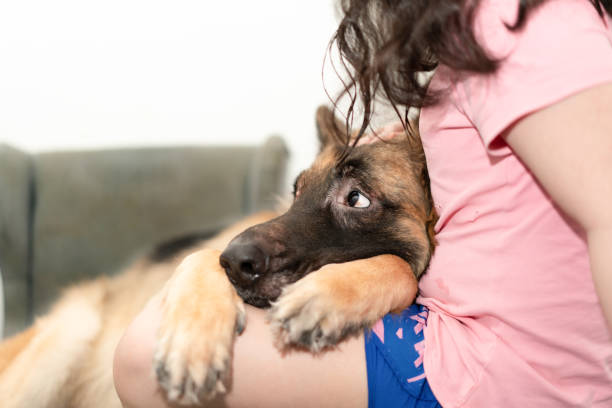German Shepherds are accepted for their wisdom and devotion, but they also have a knack for vocalizing their feelings. Whining is a common conduct that leaves many owners puzzled. Is your canine simply being dramatic, or is there a deeper issue?
Let’s investigate and discover the truth behind this expressive behavior. Whining is an excessively pitched sound that dogs make to express their feelings. It may be a manner to sign exhilaration, pain, or even a need for attention. German Shepherds are particularly vocal, using whining as a key part of their communication toolkit.
Understanding German Shepherd whining
Why Do Dogs Whine?
Dogs whine for diverse motives, starting from physical soreness to emotional wishes. Puppies whine to get their mom’s attention, and this conduct frequently continues into adulthood with humans. It’s a herbal and instinctive way for puppies to engage with the sector.
Is Whining a Form of Communication?
Absolutely! Whining is one of the number one methods German Shepherds use to talk with their owners. They say, “I need something,” or “I’m feeling careworn.” Paying interest to the context allows you to decode their message.
Common Reasons for Whining in German Shepherds
Whining for Attention
Your German Shepherd may also whine to grab your interest, mainly because they’ve found out it works. If whining ends in treats or cuddles, they’ll quickly associate the behavior with fine outcomes. It’s important to cope with this constructively.
Whining at Night: What It Means
Nighttime whining frequently stems from loneliness, worry, or the desire to alleviate oneself. Puppies and newly followed puppies may also whine as they adjust to their new environment. A consistent bedtime routine can help reduce this behavior.
Whining Due to Anxiety or Stress
Stressful conditions, like being left alone or hearing loud noises, can trigger whining in German Shepherds. This breed is known for forming strong emotional bonds, making it extra liable to separation tension. Recognizing strain triggers is key to dealing with this.
High-pitched Whining: Is It Serious?
An excessive-pitched whine can suggest exhilaration or ache. If it’s observed via different unusual behaviors, along with limping or hiding, it’s best to seek advice from a vet. Otherwise, it might simply be your canine’s manner of displaying enthusiasm.
Whining When I Pet Him: Why So Dramatic?
Some German Shepherds whine when petted, which may be a sign of overstimulation or pride. It’s their dramatic way of pronouncing they’re playing the eye or, occasionally, that they’d decide on a gentler contact.
Whining within the car: What’s Causing It?
Car rides can be disturbing for some puppies. Your German Shepherd may whine due to motion sickness or trendy unease.

Gradually introducing them to vehicle rides and making them revel in superb can assist in easing their discomfort.
Whining Noise vs. Barking: What’s the Difference?
Whining and barking serve exceptional purposes. Barking is often alerting or protective, while whining alerts a need, discomfort, or emotional kingdom. Understanding this difference permits you to reply as it should.
| Trigger | How to Address |
| Attention-seeking | Avoid rewarding whining; reward calm behavior instead. |
| Stress or anxiety | Identify triggers and create a safe environment for your dog. |
| Pain or discomfort | Consult a vet to address any potential medical concerns. |
| Overstimulation | Give your dog time to relax in a quiet and comforting space. |
Health Concerns Related to Whining
Whining When Getting Up: Is It Pain?
If your German Shepherd whines while getting up, it might indicate joint aches or arthritis. This is especially not unusual in older puppies. Observing their movements and consulting a vet can help you deal with potential health troubles early.
Constant Whining: When to See a Vet
Incessant whining may be a signal of an underlying scientific problem. If the conduct persists despite meeting their desires, it’s time to seek professional recommendations. Your vet can rule out fitness conditions inflicting soreness or aches.
Tips to Manage and Reduce Whining
How to Respond to Attention-Seeking Whining
Avoid worthwhile interest-seeking whining. Wait till your dog is calm before giving attention.

This enables them to learn that whining isn’t how to get what they need, selling extra suitable behavior over time.
Creating a Comforting Environment
A safe and comfortable environment can greatly reduce whining. Provide a comfy space with their favored toys and limit loud noises or other pressure triggers. A satisfied canine is less likely to whine unnecessarily.
Using Training Techniques to Curb Whining
Training is essential to control whining. Use advantageous reinforcement to reward calm behavior. Commands like “quiet” may be effective when used consistently, supporting your German Shepherd to recognize expectations.
(FAQs)
Why Does My German Shepherd Whining at Night?
Nighttime whining frequently indicates loneliness, worry, or a need to go outside. To lessen this behavior, address their desires directly and establish a comforting bedtime routine.
Is whining normal for puppies?
Yes, puppies often whine as they adjust to their surroundings or discuss desires. It’s an organic part of their development that lowers as they get older and gain self-assurance.
Can Whining Be a Sign of Separation Anxiety?
Absolutely. German Shepherds form strong bonds with their proprietors, making them liable to separation tension. Whining, pacing, and unfavorable behavior are not unusual symptoms to watch for.
How Can I Tell If It’s a Medical Issue?
If whining is accompanied by other signs, such as limping, lethargy, or a loss of urge for food, consult your vet. Early prognosis is fundamental to addressing ability and fitness issues.
Are German Shepherds More Prone to Whining?
Yes, their intelligence and sensitivity make them more vocal than some breeds. Understanding their desires and offering proper schooling can help control this trait efficiently.
Conclusion
Whining is normal behavior for German shepherds whining, often reflecting their emotional or bodily wishes. By understanding the reasons behind their whining and addressing them thoughtfully, you may make certain your loyal accomplice feels heard and supported. A little patience and care go a long way in strengthening your bond.

